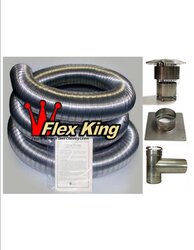I need a liner to bring my set up to a better level. Currently it's connected directly into the block off plate below the fireplace flu damper. The smoke chamber of the fireplace creates a great draft reducing space where the smoke can just circulate before it goes out of the flue.
I just saw these liners on line and was wondering if anyone is familiar. They are supposed to be better quality than the 316 Ti.
Here's a quote from the web site:
"AL29-4C®, a superferritic stainless steel designed for extreme resistance to chloride ion pitting, crevice corrosion and stress corrosion cracking, as well as general corrosion in oxidizing and moderately reducing environments. AL29-4C® is an ideal choice for resisting deleterious effects of corrosive condensates created by partially or fully condensing natural gas and propane fired heating appliances.
Why use 316ti or 316l alloy when you can have AL29-4C the best stainless steel alloy
made for chimney liners on the market today for the same price or less

Flex King liners are manufactured in Pennsylvania USA. Because we are the manufacturer of Flex King Liners and Kits we eliminate the middle man and pass the savings on to you!
The Flex King Chimney Liner Kit is a 6"x15' Stainless Steel, AL29-4C Flexible Chimney Liner. This kit comes complete with a Stainless Steel Rain Cap, Top Plate and an a Two PartTee.
With a wall thickness of .006 the Flex King is the perfect solution for your deteriorating chimney or for installation with your new heating appliance. The Flex King has the quick connect component system which is installed by simply tightening the clamps. It comes complete with a Lifetime Warranty that is transferable to the new homeowner should you sell your home."
I just saw these liners on line and was wondering if anyone is familiar. They are supposed to be better quality than the 316 Ti.
Here's a quote from the web site:
"AL29-4C®, a superferritic stainless steel designed for extreme resistance to chloride ion pitting, crevice corrosion and stress corrosion cracking, as well as general corrosion in oxidizing and moderately reducing environments. AL29-4C® is an ideal choice for resisting deleterious effects of corrosive condensates created by partially or fully condensing natural gas and propane fired heating appliances.
Why use 316ti or 316l alloy when you can have AL29-4C the best stainless steel alloy
made for chimney liners on the market today for the same price or less


Flex King liners are manufactured in Pennsylvania USA. Because we are the manufacturer of Flex King Liners and Kits we eliminate the middle man and pass the savings on to you!
The Flex King Chimney Liner Kit is a 6"x15' Stainless Steel, AL29-4C Flexible Chimney Liner. This kit comes complete with a Stainless Steel Rain Cap, Top Plate and an a Two PartTee.
With a wall thickness of .006 the Flex King is the perfect solution for your deteriorating chimney or for installation with your new heating appliance. The Flex King has the quick connect component system which is installed by simply tightening the clamps. It comes complete with a Lifetime Warranty that is transferable to the new homeowner should you sell your home."



 be emmited in the list of fuels? I will question this and get to the bottom of it before I ever buy anything.
be emmited in the list of fuels? I will question this and get to the bottom of it before I ever buy anything.